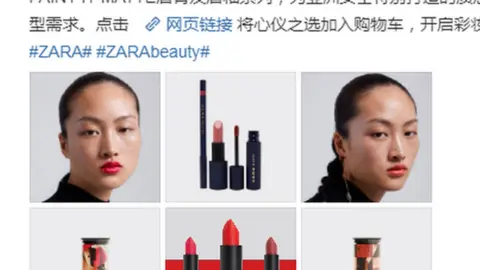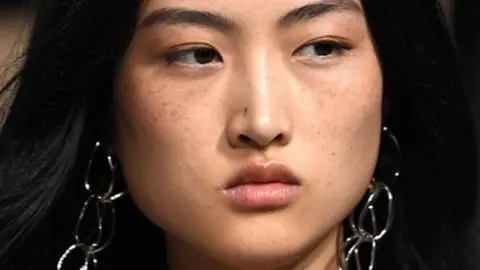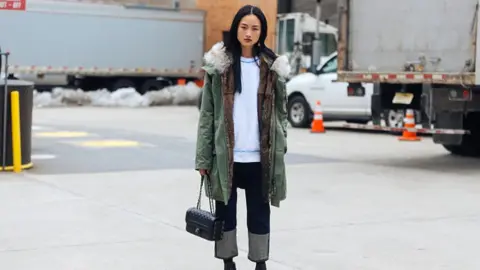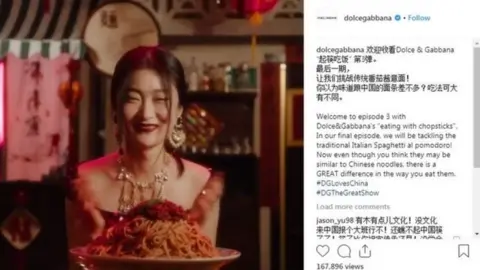Zara advert gets China asking: Are freckles beautiful?
 Zara/Sina Weibo
Zara/Sina WeiboA fierce row has broken out in China - and it is all down to some freckles.
Li Jingwen, professionally known as Jing Wen, has attracted considerable attention for her freckled appearance in a campaign for a new range of cosmetics for Spanish fashion retailer Zara.
Chinese daily Global Times says that her freckles have made her appearance "iconic". But they have sparked debate in Chinese social media, as it is rare for Chinese people to have them.
Some say her appearance in the campaign "uglifies" the Chinese people, but others have leapt to her defence, calling for more to be done in the country to help people embrace their natural beauty.
'I really hated them'
Jing Wen, who is from the southern Chinese city of Guangzhou, has become a recognisable face in the modelling world over the last five years.
She has modelled for a number of luxury and high-street brands, including Calvin Klein and H&M.
 Getty Images
Getty ImagesShe has not responded to the advert controversy, but has spoken about her earlier insecurities at having freckles. She told Vogue magazine in October 2016: "When I was little, I really hated them because normally Asian people don't have them.
"In high school, I always tried to cover them, but now it's ok. I like them, and that's enough."
Having clear, unblemished skin has been the preferred beauty norm for decades in China, as well as in wider East Asia.
Consequently, her appearance in Zara's latest campaign has been regarded as controversial in China, and drew significant backlash from users on the popular Sina Weibo microblog.
Since Zara launched its advertising campaign on Friday, many in China have voiced confusion about the brand's decision to feature a model with freckles.
Some said that Ms Li's appearance looked "ugly" to them.
Others have gone further, questioning whether Zara was "insulting" or "defaming the Chinese", with one saying: "such pictures featuring an Asian model with freckles and an expressionless pie-shaped face mislead Westerners' impressions about Asian women, and can lead to racism against Asian women."
'More aesthetic diversity'
The popular Pear Video website interviewed a representative from Zara, who said the advertisements were targeted at their global market, and not specifically at China.
"The aesthetics of the Spanish people are different," they said. "Our models are all photographed purely, the pictures aren't changed, and they're not modified."
They refuted suggestions that Ms Li had been "uglified", saying: "She has always looked like this, her face has not been photoshopped, she was photographed naturally."
 Getty Images
Getty ImagesZara's response has led to tens of thousands of Weibo users posting using the hashtag #ZaraRespondsToUglifyingChineseModelComments.
Many are applauding Zara's decision not to photoshop Ms Li, and voicing their anger that she is seemingly being bullied by people from her own country.
"This Chinese model has suffered discrimination from her compatriots," says one user, receiving hundreds of thousands of likes.
"How much of an inferiority complex do the Chinese people have?" another asks.
Many praise her "natural beauty" and say that China should do more to show different perceptions of what is beautiful.
"The ideas of what is aesthetically pleasing is too narrow to so many people," one user says. Another adds that there should be "more aesthetic diversity".
Showing how much they 'love the country'
Some social media users have turned their criticism on the government for what they see as a continued campaign to attack foreign brands, under the guise of "patriotism".
The China Daily newspaper highlights that "those who complain about Zara's new advertisement might do so to prevent the nation's image from being hurt" amid a "lack of cultural confidence".
Many users say there are similarities between the reception to Zara's campaign, and a campaign last year by luxury brand Dolce & Gabbana.
The latter, which featured a Chinese model eating pizza with chopsticks, received fierce criticism from the public for being culturally insensitive.
 Dolce & Gabbana/Instagram
Dolce & Gabbana/InstagramAnd some users say that since the D&G incident, it has become trendy to call out companies or individuals over perceived insults to the Chinese public.
One user says: "Before the D&G ad was called out for being insulting, I wouldn't have thought about watching its video twice." They said they felt a "general feeling of inferiority" has grown among the Chinese public since.
Another user adds that a wave of companies and individuals have been smeared over "insults to China", noting that the D&G incident was "raised to diplomatic level".
However, they say the attempt to smear Zara is "overkill". Another adds: "I feel as though some of my countrymen aren't really patriotic, but are now simply showing how much they 'love the country' by participating in a siege."
BBC Monitoring reports and analyses news from TV, radio, web and print media around the world. You can follow BBC Monitoring on Twitter and Facebook .
